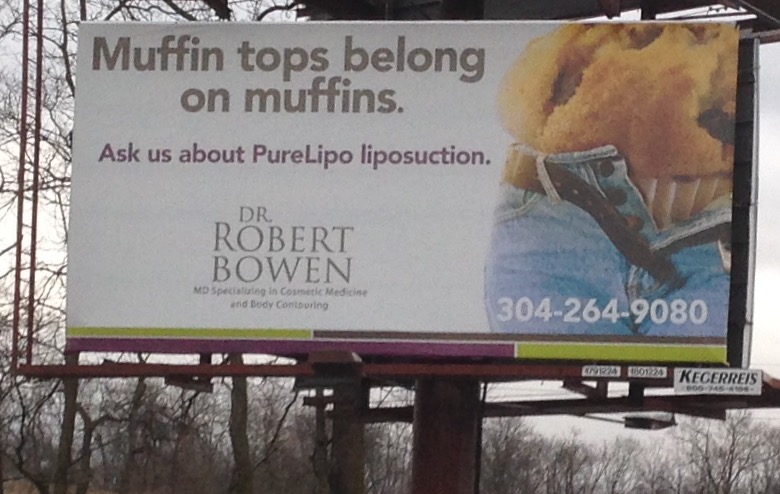On Muffin Tops, Billboards, and Beauty

March 30, 2015

This is a billboard advertisement just minutes away from my house. I have to drive by it on many occasions. It’s no wonder why so many women, from tweens to moms, have such body-image issues. A plastic surgeon, who is ostensibly all about helping people feel better about their bodies, is just showing his hand.
Women, they want you to feel horrible about yourself. And they want you to be objectified. We have been reduced to being ogled like a piece of food---and all this time I thought muffins were good things!
I remember years ago I had to have a small cist removed from my back and I was referred to a plastic surgeon. The whole time I was in there I was self conscious that the people in the waiting room would think I was being seen for, ahem, something else. Well that little visit got me put on their mailing list. A few short weeks later I received a mailer for their latest technologies. They had carefully worded this advertisement to make women feel bad about their bodies. Apparently I now had to be worried about banana rolls on my thighs, muffin tops over my jeans, wings that aren’t meant for flying, and worst of all, as I was just beginning to feel like the new laugh lines appearing on my face added character, I read their new name: parenthesis. Well that didn’t sound good! Instead of aging gracefully, with lines revealing the joy I’ve had in life, I now felt like my mouth was trapped between two punctuation marks. I decided that I was going to keep calling them laugh lines, daggone it!
But now it seems these “doctors” have gotten more aggressive. Instead of junk mail that we can throw in the trash, unassuming drivers are now hit smack in the face with professional devaluing. If I were the only one who ever had to drive past this billboard, I would just roll my eyes and maybe say a few words that aren’t very Christian. But I have two teenage daughters and a ten-year-old son. I am appalled that they have to see such a demeaning message.
What chance do our children have when they are blasted with such a message, from a doctor, that the size of their midsection determines their worth as a woman? Or let’s back it up from there, in what situation are they going to find themselves in with their pants half unzipped, longing for a loving response and admiration for their beauty?
Because, yes, women want to be beautiful. But what is our expectation for being loved and accepted as beautiful? Is it so everyone driving down Route 9 will want to honk their horns at us? Do we really measure our beauty by the number of whistles we provoke from construction workers or the number of likes our latest selfie racked up? Can a doctor make me beautiful? Do I want my son to be told this is what he is to look for in a woman?
I will repeat myself here by insisting that beauty is not something to be consumed (even though muffins are). Beauty is worthy of proper admiration, but let’s not lower our standards and reduce it to a waistline. True beauty is not cheap and it consists of so much more than one physical attribute.
Beauty is a package deal, and our expectation for being valued, loved, and even admired for our beauty will never be met in another person’s quick judgment of our figure. I’ve quoted this gem from C.S. Lewis’s “The Weight of Glory” before, but it does us all good to read it again:
We do not want merely to see beauty, though, God knows, even that is bounty enough. We want something else which can hardly be put into words---to be united with the beauty we see, to pass into it, to receive it into ourselves, to bathe in it, to become part of it.
We don’t only want to be beautiful for a compliment or a cheap thrill. And we don’t just want to notice beauty from afar. Lewis acknowledges something we all ache for. We want to be known and accepted. And we want to participate in beauty. Beauty isn’t something that we horde, but something we share in an appropriate way in our different relationships. And it doesn’t point to ourselves. Beauty isn’t a commodity. And it is truly valuable. We all want it, and Lewis articulates this so well:
But we pine. The sense that in this universe we are treated as strangers, the longing to be acknowledged, to meet with some response, to bridge some chasm that yawns between us and reality, is part of our inconsolable secret. And surely, from this point of view, the promise of glory, in the sense described, becomes highly relevant to our deep desire. For glory means good report with God, acceptance by God, response, acknowledgement, and welcome into the heart of things. The door on which we have been knocking all our lives will open at last.
We are blessed to see beauty all around us. At moments in our lifetime, we are blessed to share in the beauty. But:
Someday, God willing, we shall get in...
Meanwhile the cross comes before the crown and tomorrow is a Monday morning.
If we have the proper eternal perspective, we long for that beatific vision and our own glorification when our unity in Christ will be consummated and we will be like him. Like Lewis, I challenge you to think of how this reality changes the way we treat our neighbor:
The load, or weight, or burden of my neighbor's glory should be laid on my back, a load so heavy that only humility can carry it, and the backs of the proud will be broken.




